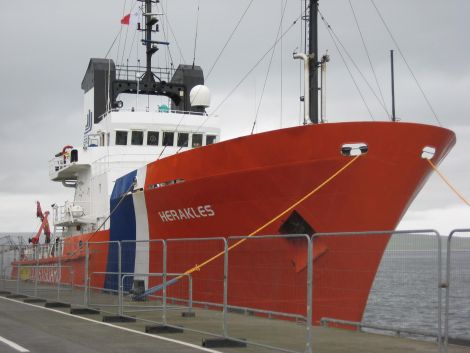News / Relief as emergency tug’s future is secured
POLITICIANS have reacted with relief after the UK Government confirmed that it has again abandoned plans to remove the emergency towing vessel (ETV) covering the Northern Isles.
UK transport minister Robert Goodwill confirmed on Wednesday that the coastguard tug contract would be extended until around 2021 following months of uncertainty.
It was the second time in just six years that the ETV’s future had been placed under threat by Westminster.
The current Conservative government waited until just days before the MV Herakles contract was due to expire this spring before granting a six-month reprieve. That had left the contract due to expire on 30 September.
The Tories had preivously said the vessel’s retention was “not a spending priority”.
But, having asking the Maritime and Coastguard Agency (MCA) to look at alternative options, Goodwill said it had been decided there was a “strong case for the UK Government to step in to allow this vital service to continue”.
“The ETV in Scotland saves lives and protects the Scottish coast from damaging pollution,” he said. “I am delighted to confirm the UK Government has secured its future by providing funding for the next five years.
“This service is absolutely critical to ensuring emergency services can respond swiftly to incidents off the coast of Scotland.”
He said the MCA had conducted “extensive” consultation and its review concluded the commercial towage market “cannot currently reliably meet the need for a dedicated service to cover the seas around Scotland”.
Scottish secretary of state David Mundell said he was pleased with the decision to keep the ETV, with islands councils having “imrpessed upon us how important it is to maritime safety in the area”.
“The UK Government has listened to what they have said, and is now able to secure funding to maintain this vital safety vessel in the north of Scotland.”
Become a member of Shetland News
Tendering for a new contract of “up to” five years will now commence, and the MCA will seek to recover the costs of the ETV from the shipping industry wherever possible.
In the longer term it will explore opportunities for the vessel to take on “low-risk” commercial work with the aim of reducing the overall cost to the taxpayer. Any costs recovered will go towards additional patrolling and crew training, the government added.
Northern Isles MP Alistair Carmichael said: “Today’s announcement is a victory for all those who have fought so hard to make the case for the ETV stationed here to protect our coastline and waters.
“The tug is our environmental insurance policy and it should never have been threatened in this way, but I am delighted that our campaign has been successful. I hope that the government will now be more creative in how they use this vessel and that there will be no further uncertainty over its future.”
SIC leader Gary Robinson said: “It is clearly good news that the government has agreed to honour its commitment to funding the presence of an ETV in the Northern Isles beyond September.
“It is critical that this emergency support continues, especially given the increase in shipping relating to the oil and gas industry and the severe conditions which can exist around our shores. We look forward to seeing more detail of the level of support which will be provided.”
The emergency tugs were first introduced as a result of recommendations from Lord Donaldson in the wake of the January 1993 Braer disaster. The Liberian-flagged oil tanker, carrying 85,000 tonnes of Gullfaks crude oil, ran aground at Garths Ness near Quendale during a storm over 23 years ago.
Following a 2010 spending review at the start of the Tory-Lib Dem coalition, the isles successfully fought off an attempt to remove the ETVs – although the coastguard vessels stationed in the Western Isles and south of the border, leaving only the Kirkwall-based Herakles to cover the whole of the UK’s coastline.
Environmental organisation KIMO welcomed the news, saying the MCA’s own risk assessment confirmed that the ETV provided “a valuable safety and counter-pollution measure”.
A spokeswoman said: “KIMO believes that a minimum of two fully-funded vessels of suitable capability are required to provide adequate protection to Scottish coastlines, particularly in the light of the ongoing transport of exotic fuels from Dounreay to Sellafield and the planned transport of nuclear waste from Dounreay to the United States, which further increase the risk of a major pollution incident.”
KIMO also said the cost of maintaining ETVs “will be repaid many times over if they are successful in preventing just a single vessel disablement becoming a major environmental disaster”.
Become a member of Shetland News
Shetland News is asking its readers to consider paying for membership to get additional perks:
- Removal of third-party ads;
- Bookmark posts to read later;
- Exclusive curated weekly newsletter;
- Hide membership messages;
- Comments open for discussion.
If you appreciate what we do and feel strongly about impartial local journalism, then please become a member of Shetland News by either making a single payment, or setting up a monthly, quarterly or yearly subscription.































































